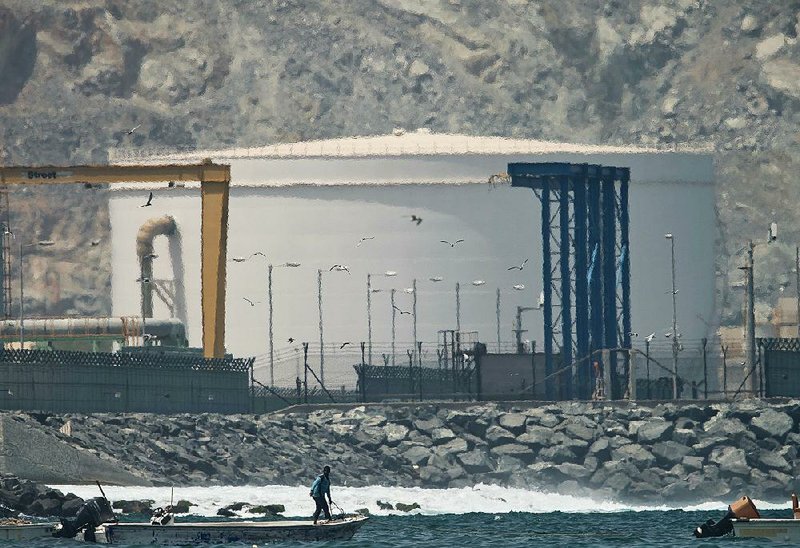FUJAIRAH, United Arab Emirates -- An American military team's initial assessment is that Iranian or Iranian-backed proxies used explosives Sunday to blow large holes in four ships anchored off the coast of the United Arab Emirates, a U.S. official said Monday.
The official said each ship has a 5- to 10-foot hole in it, near or just below the waterline, and the team's early belief is that the holes were caused by explosive charges. The team of U.S. military experts was sent to investigate the damages at the request of the UAE, but American officials have not provided any details about what exactly happened or any proof as yet about the possible Iranian involvement in the explosions.
The official was not authorized to discuss the investigation publicly and spoke on condition of anonymity.
Two Saudi oil tankers, a Norwegian-flagged vessel, and a bunkering tanker flagged in Sharjah, one of the UAE's seven emirates, all suffered similar damage Sunday.
The U.S. issued a new warning to sailors as the UAE's regional allies condemned Sunday's alleged sabotage attack that the UAE says targeted ships off the coast of its port city of Fujairah.
It came just hours after Iranian and Lebanese media outlets aired false reports of explosions at the port.
While details of the incident remain unclear, it raised risks for shippers in a region vital to global energy supplies at a time of increasing tensions between the U.S. and Iran over its unraveling nuclear deal with world powers.
The U.S. has warned ships that "Iran or its proxies" could be targeting maritime traffic in the region. America is deploying an aircraft carrier and B-52 bombers to the Persian Gulf to counter alleged, still-unspecified threats from Tehran.
A statement from Saudi Energy Minister Khalid al-Falih said the kingdom's two oil tankers, including one due to later carry crude to the U.S., sustained "significant damage."
The MT Andrea Victory, one of the damaged ships, sustained a hole in its hull just above its waterline from "an unknown object," its owner Thome Ship Management said in a statement. Images Monday of the Andrea Victory, which the company said was "not in any danger of sinking," showed damage similar to what the firm described.
Emirati officials identified the third ship as the Saudi-flagged oil tanker Amjad. Ship-tracking data showed the vessel still anchored off Fujairah, apparently not in immediate distress. The fourth ship was the A. Michel, the bunkering tanker.
The U.S. Navy's 5th Fleet, which patrols the Persian Gulf and wider region from its base in Bahrain, declined to comment on the incident. The Navy runs a small supply operation out of the nearby Emirati naval base in Fujairah.
Authorities in Fujairah, also a UAE emirate, also declined to speak to the Associated Press. Emirati officials stopped AP journalists from traveling by boat to see the ships.
Iran's Foreign Ministry condemned the possible shipping attacks as "alarming and regrettable" and said it would have a "negative effect" on shipping safety and maritime security, according to the semi-official Iranian Students' News Agency.
Abbas Mousavi, a Foreign Ministry spokesman, suggested that the sabotage might have been carried out as part of a conspiracy to ignite conflict in the region. He cautioned against what he called "plots by ill-wishers to disrupt regional security" and called for an inquiry.
The incident raises questions about maritime security in the UAE, home to Dubai's Jebel Ali port, the largest man-made deep-water harbor in the world that is also the U.S. Navy's busiest port of call outside of America. From the coast, AP journalists saw an Emirati coast guard vessel patrolling near the area of one of the Saudi ships in Fujairah, some 130 miles northeast of Dubai on the Gulf of Oman.
Fujairah also is about 85 miles south of the Strait of Hormuz, the narrow mouth of the Persian Gulf through which a third of all oil at sea is traded. Claims of sabotage caused jitters in global oil markets, as benchmark Brent crude rose in trading to over $71.50 a barrel Monday, a change of 1.3%.
Asked at the White House about the incident, President Donald Trump responded: "It's going to be a bad problem for Iran if something happens."
The U.S. Maritime Administration, a division of the U.S. Transportation Department, issued a new warning Sunday to sailors about the alleged sabotage and urged shippers to exercise caution in the area for the next week.
It remains unclear if the previous warning from the U.S. Maritime Administration is the same perceived threat that prompted the White House on May 4 to order the naval and bomber deployment.
Information for this article was contributed by Aya Batrawy, Bassem Mroue, Amir Vahdat, Malak Harb, and Lolita C. Baldor of The Associated Press; and by Liz Sly of The Washington Post.
A Section on 05/14/2019
